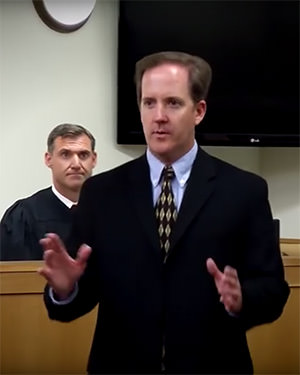victims for over 25 years.
Why I Use Focus Groups in My Denver Personal Injury Cases
 I recently posted an ad in Craig’s List, asking for people who might want to spend 30 to 45 minutes pretending to be a jury for a personal injury case that I’m working on. Fortunately, more than 20 people responded and showed up at the Carla Madison Rec Center, where I booked a room and organized two different time slots for my prospective “jury members.” The goal: to share my case, get their verdict and learn where my case had holes and even strengths that I hadn’t considered yet.
I recently posted an ad in Craig’s List, asking for people who might want to spend 30 to 45 minutes pretending to be a jury for a personal injury case that I’m working on. Fortunately, more than 20 people responded and showed up at the Carla Madison Rec Center, where I booked a room and organized two different time slots for my prospective “jury members.” The goal: to share my case, get their verdict and learn where my case had holes and even strengths that I hadn’t considered yet.
And, as it turned out, these focus groups helped me a ton.
Why would you want to know that people think your client is partially to blame?
Never Make Assumptions About Trials
This particular case was not about a motorcycle accident or car accident but was instead about a dog bite. Sadly, this dog bit a baby so badly that her face is disfigured for life. You’d think it would be a slam-dunk case against the dog owner (aka: the dog owner’s insurance company), but I know to never make assumptions about how a jury will respond to evidence.
I presented my case to the jury, including a slide show of the baby’s face and of the dog. Then my associate, Cara New, presented the opposing side. We left the room and let the “jurors” deliberate for 20 minutes. When we came back into the room, we asked them several questions:
- What was their verdict? Was the dog owner guilty or not? How did they arrive at their decision?
- If the verdict was against the dog owner, how much did they think the baby’s pain and suffering were worth?
- Then we opened it up to discussion just to pick their brains.
Realized Opportunities
 It was fascinating! I learned that several of the jurors thought the baby’s parents had been partially responsible for the accident and why. They asked questions that helped me to realize an opportunity in the case that I could use to my client’s advantage. I tested out different calculations on them to help determine how to arrive at a fair pain-and-suffering total. Overall, it was like I had organized a big think tank of my client’s peers who fairly and objectively helped me hone my case for success.
It was fascinating! I learned that several of the jurors thought the baby’s parents had been partially responsible for the accident and why. They asked questions that helped me to realize an opportunity in the case that I could use to my client’s advantage. I tested out different calculations on them to help determine how to arrive at a fair pain-and-suffering total. Overall, it was like I had organized a big think tank of my client’s peers who fairly and objectively helped me hone my case for success.
Some people might say, “Why would you want to know that people think your client is partially to blame? Aren’t you supposed to defend your client no matter what?!” My answer is this: Would you rather have a dog bite attorney in Denver who blindly takes your side and waltzes into a courtroom unprepared for the challenges ahead? Or would you like your attorney to understand every angle that the other side might try to exploit and prepare for it in advance?
Using my focus groups, I actually discovered a bias among a few of my “jury” members that I needed to manage better. It had to do with the breed of the dog and assumptions made about that breed. Their thoughts made it clear that I needed to address this bias in my case.
The research company, Litigation Insights, explained the benefits of focus group research this way:
“Potential jurors have pre-existing opinions that will impact your case. Focus Group research uncovers these implicit assumptions, questions and reactions – both positive and negative. It also explores jurors’ personal experiences and concerns surrounding your case, and reveals their prejudices and expectations.
Focus groups are most helpful early in discovery, before the bulk of depositions have been taken, to help frame your witness themes, case themes and case strategy (aka Early Case Assessment). For instance, in a water contamination case, the plaintiff was only seeking remediation; however, at the beginning of the focus group designed to test the issues in the case, jurors immediately asked, “How many people are sick?” Here, it was clear jurors had an expectation that water contamination was linked with illness, despite the explanation that the plaintiff was looking only for remediation. Jurors’ reactions told us that we needed to neutralize this automatic assumption with a theme that explained that there were no injuries or illnesses being claimed in the case.”
Most Denver Personal Injury Attorneys Don’t Want to Go to Trial
 Now, here’s a well-kept secret among personal injury attorneys: most of them don’t like going to court and will actually settle cases too soon so that they can avoid a trial. In my estimation, that is unethical. An attorney is ethically obligated to represent his or her clients to their maximum ability. Choosing to settle a case for less than a client needs, rather than going to trial, is unethical.
Now, here’s a well-kept secret among personal injury attorneys: most of them don’t like going to court and will actually settle cases too soon so that they can avoid a trial. In my estimation, that is unethical. An attorney is ethically obligated to represent his or her clients to their maximum ability. Choosing to settle a case for less than a client needs, rather than going to trial, is unethical.
Personally, I have no problem taking cases all the way to a trial, which makes me a better personal injury attorney for my clients from the very first time we meet. How? Because my willingness to go to trial changes the way I build a case, take notes, take depositions, manage conversations with insurance companies, and even drives me to organize focus groups. Absolutely everything can impact your case in a trial. If you have an attorney who simply likes settling cases before they ever reach a jury, then he or she is approaching your case completely differently from an attorney who is willing to go all the way.
(Hint: If you’re looking for a personal injury attorney in Colorado, one of the questions you should ask is this: “How many cases have you taken to trial? How many did you win?” And ask for proof.)
Focus Groups Reflect Values
Speaking of proof: If you need more evidence of the value of focus groups, check out what Douglas Keene at The Jury Expert says:
Properly conducted focus groups are extremely useful in getting reactions to a wide array of aspects of the case. While it is not prudent to expect that the “verdict” of a small group research project will be repeated at trial, it is very likely that the same values, hot buttons, and sensibilities that engage the research group will resonate in the jury room.
- What do jurors want in the way of persuasive evidence? Brainstorm with them about the evidence that they used to come to their conclusions, and what additional evidence they would need to change their minds.
- What will a jury think of the witnesses? Show brief tape excerpts from depositions and solicit feedback.
- What sorts of demonstrative evidence will be helpful in getting this story across? Devise a focus group to examine what you have in mind and offer suggestions.
- What themes and language resonate most effectively with jurors who hear this set of facts? Lay out the story and get the group to describe their associations, impressions and reactions to the situation.
I share all of this information to illustrate how hard your attorney should be working for you. If you have been the victim in a motorcycle accident or car accident in Colorado, make sure you hire an attorney who is willing and able to fight for you all the way to a trial. Contact our Denver injury attorneys today for a free consultation.
Free Consultation
Search For
Recent Articles
- What Factors Affect the Outcome in a Personal Injury Case in Colorado?
- Are all motorcycles created equal?
- Frequently Asked Questions about Personal Injury Attorneys
- How Do Personal Injury Attorneys Calculate Future Medical Expenses in a Car Crash Settlement?
- Ways to Increase Your Visibility When Riding Your Bicycle in Denver
Categories
- Arvada
- Aurora
- Auto Accident eBook
- Auto Insurance
- Bicycle
- Bicycle/Motorcycle Accidents
- Bodily injury
- Car accidents
- Centennial
- Colorado
- Colorado Legislature
- community
- Concussion
- Denver
- distracted driving
- DUI Accidents
- Englewood
- Events
- Flood Insurance
- Fort Collins
- Highlands Ranch
- Hit and Run
- In The News
- insurance companies
- Lakewood
- Littleton
- Marijuana DUI
- Motorcycle Accidents
- Motorcycle Insurance
- Motorcycle Law eBook
- Motorcycles
- Newsletter
- Pedestrian
- Personal Injury Law
- Safe Driving
- Safety
- Scooters
- technology
- Thornton
- Tips
- Uncategorized
- vibrio vulnificus bacteria
- Videos
- Westminster
- Winter Driving
Archive
- April 2024
- March 2024
- February 2024
- January 2024
- December 2023
- November 2023
- October 2023
- September 2023
- August 2023
- July 2023
- June 2023
- May 2023
- April 2023
- March 2023
- February 2023
- January 2023
- November 2022
- September 2022
- April 2022
- March 2022
- February 2022
- January 2022
- December 2021
- November 2021
- October 2021
- September 2021
- August 2021
- July 2021
- June 2021
- May 2021
- April 2021
- January 2021
- December 2020
- November 2020
- October 2020
- September 2020
- August 2020
- July 2020
- June 2020
- May 2020
- April 2020
- March 2020
- February 2020
- January 2020
- December 2019
- November 2019
- October 2019
- September 2019
- August 2019
- July 2019
- June 2019
- May 2019
- March 2019
- February 2019
- January 2019
- December 2018
- November 2018
- October 2018
- September 2018
- August 2018
- July 2018
- June 2018
- May 2018
- April 2018
- March 2018
- February 2018
- January 2018
- December 2017
- November 2017
- October 2017
- September 2017
- August 2017
- July 2017
- June 2017
- May 2017
- April 2017
- March 2017
- February 2017
- January 2017
- December 2016
- November 2016
- October 2016
- September 2016
- August 2016
- July 2016
- June 2016
- May 2016
- April 2016
- March 2016
- February 2016
- January 2016
- December 2015
- November 2015
- October 2015
- September 2015
- August 2015
- July 2015
- June 2015
- May 2015
- April 2015
- February 2015
- December 2014
- November 2014
- October 2014
- September 2014
- July 2014
- June 2014
- May 2014
- April 2014
- March 2014
- February 2014
- January 2014
- October 2013
- October 2012
- September 2012
- August 2012
- July 2012
- February 2012
- August 2011
- March 2011
- October 2010